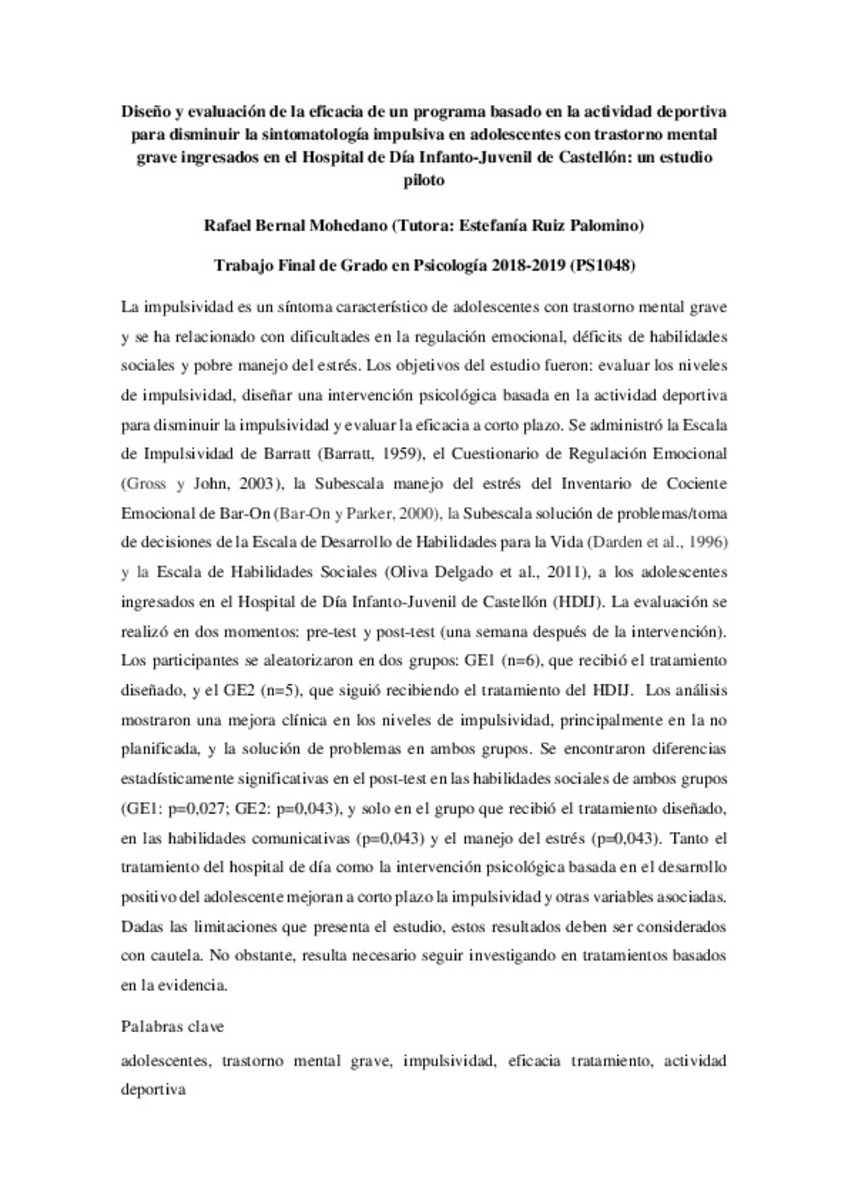Mostrar el registro sencillo del ítem
Design and evaluation of the effectiveness of a sport-based intervention to teduce impulsive symptoms in an adoslescents with severe mental disorder admitted to the Child and Adolescent Day Hospital of Castellón: a pilot study
| dc.contributor.author | Bernal Mohedano, Rafael | |
| dc.contributor.other | Ruiz-Palomino, Estefania | |
| dc.contributor.other | Universitat Jaume I. Departament de Psicologia Bàsica, Clínica i Psicobiologia. | |
| dc.date.accessioned | 2019-10-17T06:58:28Z | |
| dc.date.available | 2019-10-17T06:58:28Z | |
| dc.date.issued | 2019-07-16 | |
| dc.identifier.uri | http://hdl.handle.net/10234/184294 | |
| dc.description | Treball Final de Grau en Psicologia. Codi: PS1048. Curs: 2018/2019. | ca_CA |
| dc.description.abstract | Impulsivity is a characteristic symptom of adolescents with severe mental disorder and it has been related to difficulties in emotion regulation, social skills deficits and poor stress management. The aims were: to evaluate the levels of impulsivity, to design a sport-based psychological intervention based on sports activity to reduce impulsivity and to evaluate the effectiveness of short term. The Barratt Impulsiveness Scale (Barratt, 1959), Emotion Regulation Questionnaire (Gross & John, 2003), Stress Management Subscale of the BarOn Emotional Quotient Inventory (Bar-On & Parker, 2000), Problem-Solving/ DecisionMaking Subscale of the Life Skills Development Scale (Darden et al., 1996) and Social Skills Scale (Oliva Delgado et al., 2011) were administered to the patients of the Child and Adolescent Day Hospital of Castellón (HDIJ). The evaluation was carried out in two moments: pre-test and post-test (one week after the intervention). Participants were randomized into two groups: GE1 (n=6), who received the designed treatment, and GE2 (n=5), who continued to receive the hospital treatment. The analysis showed a clinical improvement in the levels of impulsivity, mainly in the unplanned, and the problems solving in both groups. Statistically significant differences were found in the post-test in the social skills of both groups (GE1: p=0,027; GE2: p=0,043), and only in the group that received the designed treatment, in the communication skills (p=0,043) and stress management (p=0,043). Both the treatment of the day hospital and the psychological intervention based on the positive development of the adolescent improve impulsivity and other associated variables in the short term. Due to the limitations of the study, these results should be considered with caution. However, it is necessary to continue investigating evidence-based treatments. | ca_CA |
| dc.description.abstract | La impulsividad es un síntoma característico de adolescentes con trastorno mental grave y se ha relacionado con dificultades en la regulación emocional, déficits de habilidades sociales y pobre manejo del estrés. Los objetivos del estudio fueron: evaluar los niveles de impulsividad, diseñar una intervención psicológica basada en la actividad deportiva para disminuir la impulsividad y evaluar la eficacia a corto plazo. Se administró la Escala de Impulsividad de Barratt (Barratt, 1959), el Cuestionario de Regulación Emocional (Gross y John, 2003), la Subescala manejo del estrés del Inventario de Cociente Emocional de Bar-On (Bar-On y Parker, 2000), la Subescala solución de problemas/toma de decisiones de la Escala de Desarrollo de Habilidades para la Vida (Darden et al., 1996) y la Escala de Habilidades Sociales (Oliva Delgado et al., 2011), a los adolescentes ingresados en el Hospital de Día Infanto-Juvenil de Castellón (HDIJ). La evaluación se realizó en dos momentos: pre-test y post-test (una semana después de la intervención). Los participantes se aleatorizaron en dos grupos: GE1 (n=6), que recibió el tratamiento diseñado, y el GE2 (n=5), que siguió recibiendo el tratamiento del HDIJ. Los análisis mostraron una mejora clínica en los niveles de impulsividad, principalmente en la no planificada, y la solución de problemas en ambos grupos. Se encontraron diferencias estadísticamente significativas en el post-test en las habilidades sociales de ambos grupos (GE1: p=0,027; GE2: p=0,043), y solo en el grupo que recibió el tratamiento diseñado, en las habilidades comunicativas (p=0,043) y el manejo del estrés (p=0,043). Tanto el tratamiento del hospital de día como la intervención psicológica basada en el desarrollo positivo del adolescente mejoran a corto plazo la impulsividad y otras variables asociadas. Dadas las limitaciones que presenta el estudio, estos resultados deben ser considerados con cautela. No obstante, resulta necesario seguir investigando en tratamientos basados en la evidencia. | ca_CA |
| dc.format.extent | 8 p. | ca_CA |
| dc.format.mimetype | application/pdf | ca_CA |
| dc.language.iso | eng | ca_CA |
| dc.publisher | Universitat Jaume I | ca_CA |
| dc.rights | Atribución-NoComercial-CompartirIgual 4.0 Internacional | * |
| dc.rights.uri | http://creativecommons.org/licenses/by-nc-sa/4.0/ | * |
| dc.subject | Grau en Psicologia | ca_CA |
| dc.subject | Grado en Psicología | ca_CA |
| dc.subject | Bachelor's Degree in Psychology | ca_CA |
| dc.subject | Adolescents | ca_CA |
| dc.subject | Severe mental disorder | ca_CA |
| dc.subject | Impulsivity | ca_CA |
| dc.subject | Treatment efficacy | ca_CA |
| dc.subject | Sport activity | ca_CA |
| dc.subject | Adolescentes | ca_CA |
| dc.subject | Trastorno mental grave | ca_CA |
| dc.subject | Impulsividad | ca_CA |
| dc.subject | Eficacia tratamiento | ca_CA |
| dc.subject | Actividad deportiva | ca_CA |
| dc.title | Design and evaluation of the effectiveness of a sport-based intervention to teduce impulsive symptoms in an adoslescents with severe mental disorder admitted to the Child and Adolescent Day Hospital of Castellón: a pilot study | ca_CA |
| dc.type | info:eu-repo/semantics/bachelorThesis | ca_CA |
| dc.educationLevel | Estudios de Grado | ca_CA |
| dc.rights.accessRights | info:eu-repo/semantics/openAccess | ca_CA |
Ficheros en el ítem
Este ítem aparece en la(s) siguiente(s) colección(ones)
-
Grau en Psicologia [1080]
PS1048








